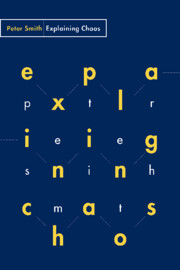1 - Chaos introduced
Published online by Cambridge University Press: 22 September 2009
Summary
‘Chaos theory’: the very name suggests a paradox. For chaos, in the ordinary sense, is precisely the absence of order; and how can we hope to impose theoretically disciplined order on the essentially disordered?
It is far too late to change the name. So let's make it clear at the very outset that ‘chaos’ here must be taken as a term of art, stripped of most of its ordinary connotations: and ‘chaos theory’ is just the popular label for a body of theory about certain mathematical models and their applications. A first introductory task, then, is to say something about the kinds of mathematical models that are in question.
One mark of ‘chaos’ is sensitive dependence on initial conditions: that is to say, a chaotic system starting off from two very similar initial states can develop in radically divergent ways. Such sensitive dependence is often referred to as ‘the Butterfly Effect’. A small blue butterfly, let's suppose, sits on a cherry tree in a remote province of China. As is the way of butterflies, while it sits it occasionally opens and closes its wings. It could have opened its wings twice just now; but in fact it moved them only once. And – because the weather system exhibits sensitive dependence – the minuscule difference in the resulting eddies of air around the butterfly eventually makes the difference between whether, two months later, a hurricane sweeps across southern England or harmlessly dies out over the Atlantic.
- Type
- Chapter
- Information
- Explaining Chaos , pp. 1 - 19Publisher: Cambridge University PressPrint publication year: 1998
- 1
- Cited by



